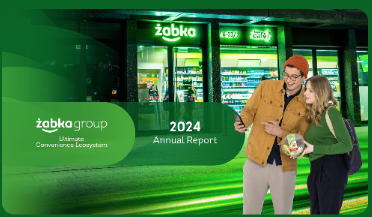

Nasza dekarbonizacyjna misja

Aby przeprowadzić płynną transformację w kierunku dekarbonizacji, potrzebna jest praca wielu osób na różnych szczeblach organizacji i poza nią, dlatego w najbliższych latach chcemy skupić się na budowaniu zaangażowania i współpracy. Wierzymy, że kluczem do sukcesu jest zrównoważone i wspólne działanie. Nasi Partnerzy biznesowi odgrywają kluczową rolę w realizacji naszej misji, dlatego liczymy na aktywne zaangażowanie w budowanie współpracy opartej na wspólnych wartościach, zasadach i zaufaniu. Uważamy, że jedynie w ten sposób nasza działalność może przynosić realną zmianę i umożliwiać prowadzenie odpowiedzialnego biznesu oraz osiągnięcie wspólnych celów dekarbonizacyjnych.
Na tej stronie znajdują się wszystkie istotne informacje na temat celów, bieżących działań i wyników związanych z dekarbonizacją w grupie Żabka oraz obszerna podstrona edukacyjna, wyjaśniająca skomplikowane terminy i zagadnienia dekarbonizacyjne. Chcemy tu również informować o wprowadzanych zmianach regulacyjnych i ich wpływie na działania naszej spółki w kontekście partnerów biznesowych.
Nasze cele i ambicje
Ograniczymy emisje gazów cieplarnianych w zakresie 1 i 2 o 25% do 2026 względem roku 2020 (bez offsetu).
Cel wyrażony w tonach ekwiwalentu dwutlenku węgla (tCO2e).
Oprócz kontynuacji projektów takich jak elektryfikacja floty czy rozwój transportu dedykowanego, planujemy również zbadać tematykę magazynów zeroemisyjnych i spróbować zaimplementować część rozwiązań w naszych Centrach Logistycznych.
Obniżymy intensywność emisji gazów cieplarnianych w sklepach w zakresie 3 o 70% do roku 2026.
Cel wyrażony w tonach ekwiwalentu dwutlenku węgla (tCO2e) na mln PLN przychodu netto CNS.
W dalszym ciągu w naszych sklepach wdrażane będą projekty z zakresu efektywności energetycznej (Fotowoltaika, Zero Heating Doors).
Zaangażujemy partnerów biznesowych odpowiedzialnych za 75% wydatków zakupowych z obszaru produktów i usług w ustalenie naukowo potwierdzonych celów redukcyjnych do końca 2026 r.
W najbliższych latach naszą największą ambicją jest intensyfikacja zaangażowania dostawców w obniżanie śladu węglowego swojego łańcucha wartości. Emisje z kategorii 1 zakresu 3 stanowią 73% całkowitych emisji organizacji co czynią ją niezwykle istotną. Ze względu na rozszerzenie wymagań SBTi o emisje z nowej kategorii FLAG (Forest, Land and Agriculture) pracujemy również nad rewizją strategii dekarbonizacji, aby adekwatnie zaadresować tę zmianę.
Nasze działania
Razem z partnerami biznesowymi dla zrównoważonego rozwoju - fair business brunch
Skuteczne rozwijanie współpracy z naszymi partnerami biznesowymi jest możliwe dzięki dzieleniu się wiedzą i wzajemnemu inspirowaniu się. Dlatego zorganizowaliśmy pierwszy fair business brunch – spotkanie w ramach platformy czysty biznes – tworząc tym samym przestrzeń do wymiany dobrych praktyk oraz dyskusji o wspólnych wyzwaniach w kameralnym gronie naszych partnerów biznesowych.
W kontekście dekarbonizacji współpraca ma wyjątkowe znaczenie, a w szczególności, gdy mowa o redukcji emisji zakresu 3. W Żabce, poza celem obniżenia intensywności emisji gazów cieplarnianych w sklepach w zakresie 3 o 70% (rok bazowy 2020), dążymy też do włączenia naszych partnerów biznesowych w walkę ze zmianami klimatycznymi. Chcemy zaangażować 75% z nich w ustalenie naukowo potwierdzonych celów dekarbonizacyjnych. Dlatego poprosiliśmy ekspertów z firm, z którymi współpracujemy na co dzień i przedstawicieli Żabki o zaprezentowanie dobrych praktyk i inspiracji z obszaru dekarbonizacji. Swoimi doświadczeniami podzielili się z zaproszonym gronem przedstawiciele firm Microsoft, Carlsberg, Stock Spirits oraz Maspex.

Tematyka spotkania koncentrowała się na dekarbonizacji, jednak kwestie etycznego i zrównoważonego łańcucha dostaw również towarzyszył dyskusjom. W tym kontekście szczególną uwagę poświęcono Kodeksowi Postępowania dla Partnerów Biznesowych Żabka Polska oraz Polityce Praw Człowieka dla Partnerów Biznesowych. Dążymy do 100% zgodności naszych partnerów z pierwszym z powyższych dokumentów do 2026 roku. By osiągnąć ten ambitny cel oferujemy naszym dostawcom wsparcie merytoryczne, a także rekomendujemy im poddawanie się audytom etycznym. Dzięki spójności z naszym Kodeksem możemy mieć pewność, że nasi partnerzy również tworzą wartość w sposób zrównoważony i z troską o planetę.
Wierzymy, że rozwijanie dalszej współpracy oraz łączenie sił z naszymi partnerami pozwoli nam wspólnie tworzyć czysty biznes!
Dowiedz się więcej o SBTi

Żabka Polska jest pierwszą firmą w Polsce, której cele dotyczące redukcji gazów cieplarnianych zostały zwalidowane przez Science Based Targets Initiative. SBTi jest wspólną, międzynarodowa inicjatywa CDP (dawniej Carbon Disclosure Project), Global Compact Organizacji Narodów Zjednoczonych, World Resources Institute (WRI) oraz WWF (World Wildlife Fund).
Jaka jest rola SBTi?
SBTi pomaga firmom określić, jak dużo i jak szybko muszą zmniejszyć swoje emisje gazów cieplarnianych, aby być zgodnym z wymaganiami najnowszych badań klimatycznych. Celem nadrzędnym organizacji jest ograniczenie globalnego ocieplenia do 1,5 stopnia Celsjusza powyżej poziomów przedindustrialnych, zgodnie z Porozumieniem Paryskim z 2015 roku.
Dlaczego warto przystąpić do SBTi?
Zatwierdzenie strategii dekarbonizacynej przez SBTi jest bardzo szanowanym zobowiązaniem w biznesie i zabiegają o nie wszystkie firmy chcące być liderem zrównoważonego rozwoju w swojej branży. Jako firma chcąca minimalizować swój negatywny wpływ na środowisko, nieustannie poszukujemy rozwiązań, które nam na to pozwolą i zarazem będą przeciwdziałać zmianom klimatu – pracujemy nad zmniejszeniem zużycia energii, poszukujemy nisko- i zeroemisyjnych źródeł energii, testujemy innowacyjne zielone technologie oraz zachęcamy naszych konsumentów do dokonywania przyjaznych Planecie wyborów.
Jak wygląda proces aplikacji do SBTi?
- Zobowiązanie – złożenie listu deklarującego zamiar wyznaczenia celu opartego o wiedzę naukową w ciągu 2 lat od wysłania zobowiązania;
- Utworzenie strategii dekarbonizacji – zgodnie z kryteriami SBTi;
- Weryfikacja – złożenie aplikacji i walidacja celu przez SBTi;
- Komunikacja – publiczne ogłoszenie celów i poinformowanie interesariuszy;
- Ujawnianie – coroczna publikacja emisji organizacji oraz progres do osiągnięcia celów.
Jakie są dalsze kroki po walidacji celów?
Oprócz pracy nad realizacją strategii i spełnieniu celów, należy monitorować wymagania SBTi, ponieważ ulegają regularnej aktualizacji i rozszerzeniu. Przykłady istotnych zmian w kryteriach:
- Zmiana minimalnej ambicji celów z “well below 2°C” do 1,5°C co w rezultacie oznacza między innymi zwiększenie minimalnej rocznej redukcji emisji z zakresu 1 i 2 do 4,2% rocznie;
- Włączenie emisji z grupy FLAG (Forest, Land and Agriculture) do zakresu raportowania.
Istotne zmiany w sposobie raportowania emisji organizacji również należy skonfrontować z wytycznymi SBTi, gdyż mogą one wpłynąć na status akceptacji celów:
- Zmiana alokacji grupy emisyjnej do innego zakresu;
- Zmiany kontroli operacyjnej wewnątrz organizacji.
Realizacja strategii dekarbonizacji w 2023 roku
Strategia Odpowiedzialności Grupy Żabka nakreśla nasze aspiracje i ścieżki rozwoju w sektorze ESG. Wypełnianie przyjętych zobowiązań wymaga wsparcia wszystkich naszych pracowników i partnerów. Wspólne poświęcenie pozwoliło nam skutecznie stawić czoła wyzwaniom minionego roku, a także wykorzystać liczne możliwości. Naszymi codziennymi działaniami zbliżamy się do realizacji ambicji zawartych w Strategii Odpowiedzialności Grupy Żabka. Wyniki, w stosunku do celów na 2023 r. prezentują się następująco:
Cel zakresu 1 i 2
Łączna emisja gazów cieplarnianych z zakresu 1 i 2 wyniosła 17 282 ton CO2e, co daje najwyższy dostępny wynik KPI. Dzięki dalszym inwestycjom w naszą flotę, w tym wymianę pojazdów oraz wdrożeniu programu motywacyjnego dla kierowców, utrzymaliśmy emisje w tym obszarze na poziomie z ubiegłego roku. Stało się tak pomimo wzrostu liczby samochodów. Nasze wysiłki w ciągu ostatnich dwóch lat mające na celu zminimalizowanie wycieków w systemach chłodniczych w naszych centrach dystrybucyjnych oraz zastąpienie czynników chłodniczych o wysokim potencjale tworzenia efektu cieplarnianego (GWP) czynnikami o niższym współczynniku GWP również przyczyniły się do zmniejszenia emisji. Ponadto kontynuowaliśmy nasze podejście polegające na dostarczaniu w 100% odnawialnej energii elektrycznej w operacjach własnych, wykorzystując gwarancje pochodzenia energii odnawialnej (REGO), aby wykazać, że została ona wytworzona ze źródeł odnawialnych. Korzystając z floty pojazdów chłodniczych, ograniczyliśmy również wykorzystanie suchego lodu w transporcie. W związku z tym, nasze emisje z zakresu 1 i 2 zmniejszyły się o 28,8% w porównaniu z poziomem bazowym z 2020 roku.
Cel zakresu 3 (downstream)
W zakresie 3 nadal koncentrujemy się na inicjatywach związanych z efektywnością energetyczną. Zastosowaliśmy zamknięte systemy chłodnicze do napojów w prawie 1,200 nowych sklepach i zero heating doors w blisko 2,000 sklepach. Oba rozwiązania są standardem w nowo otwieranych sklepach. Dodatkowo zadbaliśmy o to, aby 46% energii elektrycznej zużywanej w sklepach pochodziło ze źródeł odnawialnych, nie tylko poprzez zakup gwarancji pochodzenia, ale także poprzez zainstalowanie kolejnych 100 instalacji PV na dachach naszych sklepów. W efekcie intensywność emisji z zakresu 3 ze sklepów naszych franczyzobiorców spadła o 60% w stosunku do roku bazowego 2020.
Cel zakresu 3 (upstream)
Jeśli chodzi o emisje z zakresu 3 upstream, firma ściśle współpracuje ze swoimi partnerami biznesowymi w celu analizy śladu węglowego ich łańcucha dostaw w ramach różnych kategorii i stale przegląda bazę danych, aby obliczyć ich poziom zaangażowania w dekarbonizację. Strategia firmy zakłada, że do 2026 r. 75% jej dostawców pod względem wydatków, obejmujących zakupione towary i usługi, będzie miało cele oparte na podstawach naukowych.
Nasze polityki

Polityka Energetyczna wskazuje kierunek działań dążących do wzrostu efektywności energetycznej oraz zwiększenia udziału odnawialnych źródeł energii, zarówno w operacjach własnych Żabka (zakres 2) jak i w łańcuchu wartości (zakres 3).

Polityka dekarbonizacji wyznacza ogólne kierunki działań, zmierzające do realizacji celów klimatycznych opisanych w naszej Strategii Odpowiedzialności. Niniejsza Polityka jest także odpowiedzią na zobowiązania wynikające z udziału Żabka w inicjatywach na rzecz przeciwdziałania zmianom klimatu.

Polityka mobilności stanowi zbiór zasad i dobrych praktyk w odniesieniu do przemieszczania się w ramach wykonywania obowiązków zawodowych Pracowników i Współpracowników Żabka Polska. Jej celem jest ułatwienie podejmowania decyzji zarządczych w zakresie mobilności i środków transportu w sposób świadomy i bardziej przyjazny środowisku.

Polityka transportowa określa ogólne zasady transportu towarów w Żabka Polska, zgodne z odpowiedzialnością środowiskową i ma zastosowanie do obecnych i przyszłych Partnerów Biznesowych odpowiedzialnych za przewóz towarów. Zgodnie z Polityką przy rozwoju infrastruktury logistycznej, planowaniu dostaw oraz kontraktowaniu floty poszukiwane powinny być rozwiązania niskoemisyjne oraz minimalizujące negatywny wpływ na środowisko.
Nasze postępy
Co jeszcze możemy wspólnie ulepszyć








